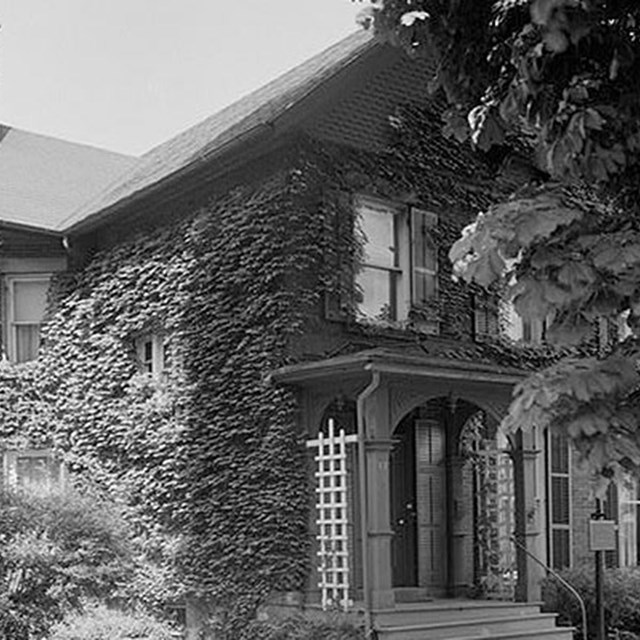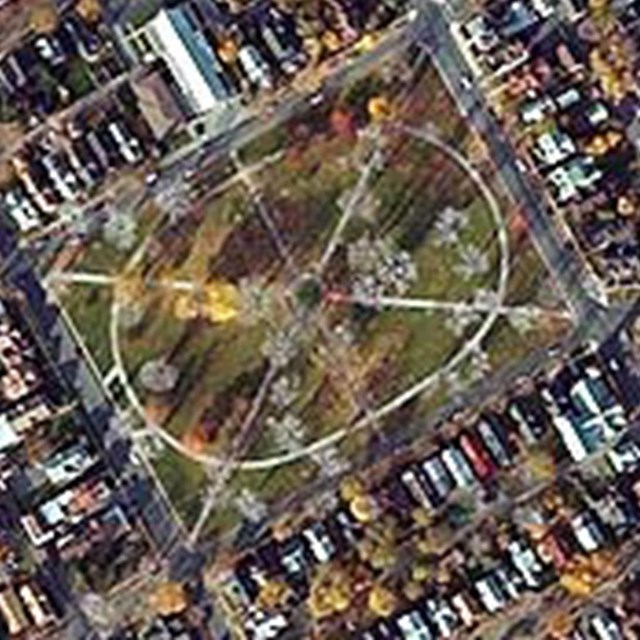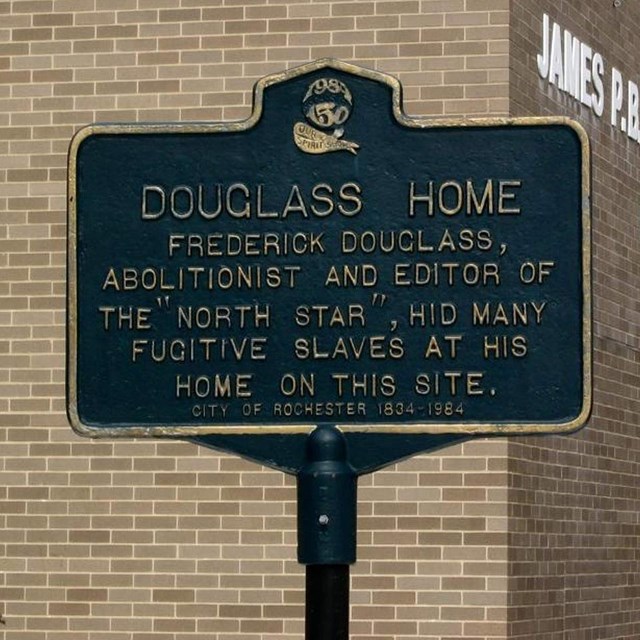Contact Us
Seeing Anew: 1870 and 1872
In the unlikeliest of places, an integrated baseball game in 1870, Susan and Frederick attempt to repair the rift between them. Then, in 1872, an act of hate threatens to push them even further apart.
Host: Ashley C. Ford
-
The Agitators Episode 4: Seeing Anew: 1870 and 1872
In the unlikeliest of places, an integrated baseball game in 1870, Susan and Frederick attempt to repair the rift between them. Then, in 1872, an act of hate threatens to push them even further apart.
- Credit / Author:
- PRX, WSCC, NPS
- Date created:
- 12/02/2020
Episode 4: Seeing Anew 1870 and 1872ASHLEY C. FORD The Women’s Suffrage Centennial Commission, the National Park Service, and PRX present The Agitators, a play by Mat Smart. [Audio logo]
As we heard at the end of Episode 3, Frederick and Susan’s fight over the 15th Amendment exploded on the stage of Steinway Hall in New York City on May 12th, 1869. The American Equal Rights Association was ripped apart -- and the women’s movement was divided into two: the activists who supported the 15th and those who didn’t.
This messy, public fight between Frederick and Susan became a turning point in American history.
It was fifty years before women won the right to vote with the 19th Amendment in 1920. It was commonly referred to as the Anthony Amendment. Even though it was ratified 14 years after Susan died, at the age of 86.
But let’s rewind. Back to 1870. We don’t know for sure when Susan and Frederick reconciled, but we know that very little time passed before Frederick was back out agitating for women to gain the ballot.
We begin in the unlikeliest of places. A baseball game.
I’m Ashley C. Ford. This is The Agitators.
Episode Four. Seeing Anew. 1870 and 1872. [The Commons Ball Field City School No. 14 Rochester, New York August 22, 1870
FREDERICK, 52 years old, sits on bleachers at a baseball game. The sound of a crowd. He holds a small brown bag of peanuts. He takes one out, breaks the shell, and eats it]
FREDERICK C’mon, now! C’mon, Mutuals! [The crack of the bat. The ball is caught. An out is recorded.] Nice try, Settle. Get ‘em next time. C’mon, Mutuals! [SUSAN, 50 years old, enters. She wears her red shawl. She carries her alligator purse and a newspaper. She sits down in the row behind FREDERICK, but not far from him. They do not acknowledge each other.] C’mon, now! Take a swing at least! [FREDERICK cracks a shell and eats a peanut] I thought you did not know how to sit.
[FREDERICK leans back and holds the bag of peanuts out to SUSAN without looking at her. She does not take one. He continues holding the bag out. Eventually, he rescinds the bag. He takes one himself. He breaks open the shell and eats the peanuts. SUSAN puts the newspaper down next to FREDERICK]
SUSAN What is this?
[The crack of the bat.]
FREDERICK Look out.
SUSAN I repeat: what is this?
FREDERICK That looks like the most recent edition of the New National Era. The finest black publication in America.
SUSAN But what is this?
[FREDERICK shells a peanut, eats it. He looks more closely at the newspaper]
FREDERICK That is an editorial about the woman suffrage movement.
SUSAN And you wrote it?
FREDERICK I did.
SUSAN Is this an apology?
FREDERICK An apology? No. It is the next step. [There is a swing and a miss] Good swing! Don’t go down easy!
SUSAN We have not spoken in over a year and then this?
FREDERICK My door has been open.
SUSAN This is one of the most brilliant arguments I have ever read in favor of women gaining the ballot.
FREDERICK Then why do you sound upset?
SUSAN Where was the man who wrote this last year – when we needed him?
FREDERICK We are at a ballgame, Susan. Charles is on deck. We can talk of this another day.
SUSAN The A. E.R. A. would not have been ripped apart if –
FREDERICK I am happy you are here. I am happy you have broken your silence to me – but take a moment to look at the miraculous sight before us. My son is a member of the Washington D.C. Mutuals – and here they are – playing a game against the Rochesters. White men and black men playing baseball together. Half the town is here. The carriages are blocking University Avenue. A barbershop quartet is roaming about. What a sight! The entire team is spending the night with us tonight. It will be bedlam. Anna insisted on staying home to prepare supper and ready the linens. I pleaded with her to come – to no avail. [The crack of the bat. An out is recorded] And now Charles is up. C’mon, Charles! C’mon, son!
SUSAN “A despotism is no less a despotism because the reigning despot may be a wise and good man.”
[The sound of the ball hitting the catcher’s glove]
FREDERICK You want to talk about this now? Fine – let us talk about this now. Women cannot be represented by men. Women must have self-definition. Self-direction. Self-representation. “No man is good enough to govern any woman without her consent.”
SUSAN Are you quoting me to me?
FREDERICK I am. [The crack of the bat. A foul ball] You and Elizabeth must be the generals. I will fall into the ranks behind you. Anytime you need me to speak – anytime you need me to write an editorial – I am at your disposal.
SUSAN You feel guilty.
FREDERICK No. I will never apologize for black men getting the right to vote. But since it happened, I – [The sound of the ball hitting the catcher’s glove] I see anew. I can see that, as long as I was disenfranchised, my fight came first. But now? I wake up in the morning and the first thing I ask myself is: “How can I agitate today to help women gain the ballot?” I am your soldier. There is no greater cause to me now. Would you like my help or not? Peanut?
SUSAN Yes.
[The crack of the bat. A foul ball. He takes a peanut. They crack open their peanuts. They chew]
SUSAN Move over. I am coming down to your row. [The sound of the ball hitting the catcher’s glove] How many times does the thrower throw it to Charles?
FREDERICK Until he gets a hit – or an out – or until the balls, fouls, and strikes reach nine.
SUSAN Then what?
FREDERICK He would get first base on what is called a base on balls.
SUSAN What is it now?
FREDERICK It is at seven. No – six. The first pitch of the at bat does not count.
SUSAN What? – why not?
[The crack of the bat.]
FREDERICK Dangummit.
SUSAN Dangummit?
FREDERICK Dangummit.
SUSAN Is he over with now?
FREDERICK No, it is another foul ball. A foul on two strikes is not a strike out, but counts in the nine balls. And a foul is only an out if a fielder catches it on the fly or after the first bounce. So now, he is at seven. C’mon, Charles! C’mon, son!
[The crowd claps. The pitch comes. . . and hits Charles. They grimace]
SUSAN Is he alright?
FREDERICK It got him on the leg. He should be fine.
SUSAN What is he doing?
FREDERICK This is new this year – if a hitter is hit by the pitch, he goes to first.
SUSAN But it is not nine balls yet.
FREDERICK This trumps that rule.
SUSAN It would seem some simplification of the rules would be helpful.
FREDERICK Oh, they are always changing the rules. They will get it right one of these days. C’mon, Fisher! Knock ‘em home! SUSAN So – when shall we discuss the next steps? The plan of attack. Do you have time tomorrow?
FREDERICK The ball club has to leave on the noon train. And I – Let me check my schedule here. . . I have to see Mayor Lutes at three. How about one o’clock?
SUSAN I have a committee meeting one-thirty. What about five o’clock?
FREDERICK I have to see my editors at five.
SUSAN How about a quarter past noon?
FREDERICK A quarter past noon it is.
SUSAN Where are you off to next?
FREDERICK I do not even know. Next is. . . Cortland.
SUSAN Cortland? Why?
FREDERICK For a –
SUSAN What?
FREDERICK . . . For a celebration commemorating the ratification of the Fifteenth Amendment. Then I must go to D.C., then Wilmington, then back to D.C. for an interview with President Grant.
SUSAN [mocking how nonchalantly he said it] “For an interview with President Grant.”
FREDERICK And you? Where are you next?
SUSAN Let me see. . . Next is New York City, then lectures in Jamestown, Westfield, Bellmont, Alfred, and Corning then New Jersey – Trenton then back to New York – Owego, Binghamton, Elmira then Pennsylvania – Williamsport then Cleveland, Ohio – Aurora, Illinois – Chicago – Detroit – then D.C. – then –
FREDERICK When are you in D.C.?
SUSAN D.C. is. . . December 8th. Will you be there?
FREDERICK I am here in Rochester December 8th, but back to D.C. December 15th. Will you still be there?
SUSAN No, I will be in Philadelphia. Then lectures in Lowville, Watertown, Potsdam, Carthage –
FREDERICK So a quarter past noon tomorrow?
SUSAN Yes, a quarter past noon tomorrow – I have it down.
FREDERICK On Madison Street or South Avenue?
SUSAN Let us meet at your house. It has been too long since I have seen Anna.
FREDERICK But it has been too long since I have seen your mother and Mary. Let us meet at yours.
SUSAN Very well – Madison Street it is. They will be happy to see you.
FREDERICK And I them. What is your handbag made of?
SUSAN Alligator.
FREDERICK Alligator?
SUSAN What?
FREDERICK Now that your movement has made you famous, you gallivant around the country carrying an alligator bag?
SUSAN It is a purse. And a woman deserves a purse of her own, does she not?
FREDERICK Yes, but –
SUSAN This purse is a political statement. Women cannot have bank accounts. We are taxed without representation. “Every woman deserves a purse of her own.”
[The sound of the ball hitting the catcher’s glove]
FREDERICK [calling out] Good eye, Fisher! Yes, I know and I agree, but this purse is also a fashion statement.
SUSAN This purse is a protest. There can be no true independence for women until we are able to control our own finances.
FREDERICK Here, here. Where was the alligator from?
SUSAN They do not tell you where the alligator is from.
FREDERICK Mm-hm, did you ask?
SUSAN No, but –
FREDERICK Then perhaps it is crocodile.
SUSAN No. It is alligator.
FREDERICK Speaking of reptiles, how is Mr. Train?
SUSAN It has been more than a year since we parted ways.
FREDERICK Remind me – why did you part ways? Because he is a racist? Or because he stopped sending checks?
SUSAN Frederick –
FREDERICK Which was it?
SUSAN . . . Both.
FREDERICK Mm-hm.
SUSAN [yelling out] C’mon! Throw the ball instead of merely talking about throwing the ball! What is this? The man catching the ball can go speak with the man throwing the ball for as long as he wishes? How long will this game last? Enough with this tomfoolery! Throw it – dangummit!
[FREDERICK looks at SUSAN, surprised. He laughs]
FREDERICK We still know how to surprise each other.
SUSAN Indeed, my friend.
[SUSAN reaches over and gently squeezes FREDERICK’s hand. FREDERICK pulls away]
FREDERICK [whispering, urgently] Stop. Do not touch me in public. Not my hand. Not my shoulder. Not at all.
SUSAN What?
FREDERICK [quietly] There is a white man – red in the face – staring at us. He clearly does not think we make a suitable pairing. Do not look at him.
SUSAN Pay him no attention.
FREDERICK He has a pistol in his pocket. I saw it glimmer in the sunlight. He does not look this way at the black man selling peanuts to the white woman. He hates me, not because I am black, but because we are talking as equals. Because you and I are friends.
SUSAN He is talking to a police officer. Dear lord –
FREDERICK Never touch me in public again. Now I must miss my son’s game.
[FREDERICK starts to leave]
SUSAN You are going to leave me here alone to face them?
FREDERICK Your skin will keep you safe.
[FREDERICK exits. Stunned, SUSAN watches him go. She looks toward the man and the police officer. She stands. The barbershop quartet begins to sing. After several moments, SUSAN leaves. Elsewhere, a spark flies through the air. Another. A fire begins to burn. The quartet continues to sing. The flames flicker. Smoke fills the air. The wood snaps. The fire grows and grows. The roar of the heat can be heard – but over it, we can still hear the hateful song. The fire engulfs all]
The Douglass House South Avenue Rochester, New York June 5, 1872
[It is almost two years later. The burnt remains of FREDERICK’s house. There are the scarred black skeletons of trees. The ground smolders. It rains. A flash of lightning. A low rumble of thunder in the distance. SUSAN, now 52 years old, holds her umbrella above both her and FREDERICK, now 54 years old. They look out over the destruction]
FREDERICK When I received word that my house burnt down, my first thought was: I am surprised it did not happen sooner. I left D.C. in such a rush, I did not think to bring an umbrella. Why would I bring an umbrella to a fire? Thank the Lord no one was hurt. I implored Anna to stay away. This destruction is too much for her to bear. . . . Even in the North, the property of the colored man is less respected and less secure than the property of any white citizen.
SUSAN They have not yet identified the cause.
FREDERICK There is no question of who did this. And why.
SUSAN The police are not yet calling it arson.
FREDERICK They can call it whatever they please. My time here is through. Washington, D.C. will be my home now.
SUSAN Please do not say that.
FREDERICK It is the Ku Klux spirit that lit this match.
SUSAN But this is Rochester.
FREDERICK Indeed – but even though Rochester is among the most liberal of Northern cities, there is still hatred. Whether it is out in the open or boiling below.
SUSAN Please wait until the investigation is over before you –
FREDERICK There does not need to be an investigation. Can you not see what is smoldering before you?
SUSAN Yes, but –
FREDERICK This is arson. This is hate. I have been enduring it my entire life and so this comes as no surprise. But what pains me more so than whoever did this – is that you, one of my oldest friends, do not immediately condemn this act as arson and hate. What is it that keeps driving us apart? Is it the Fifteenth Amendment? Is it an angry mob? An angry man at a baseball game? Is it whoever lit this match? It always seems to be someone else – somewhere else – but what if – What if it is right here between us?
SUSAN Frederick, I feel a pain in my chest as though my own house burnt down.
FREDERICK But your house was not burnt down. Mine was. . . . We are standing here the two of us who love one another – we are looking at the same thing and yet, we see two different realities.
SUSAN . . . I do not want to believe my city is capable of this. I do not want you to leave. I do not want to lose my friend.
FREDERICK Do you still believe this can be a country for all?
SUSAN Yes.
FREDERICK Then look at what is before you and try to see what I see.
SUSAN . . . I see the skeletons of trees you planted some twenty-five years ago. I see Anna’s lilacs turned to ash. And if I look up and down the road, I see that no other property has so much as a flower out of place. This is the work of an incendiary of a hate-filled person who wishes to drive away Rochester’s most beloved son. Do not let them win. Please do not leave.
FREDERICK There is nothing left for me here. (FREDERICK starts to leave. He sees something. He reaches into the burnt remains and pulls out his violin case. He takes a deep breath and opens the case. Miraculously, the violin is in perfect condition. There is not so much as a scratch on it. He takes out the violin. He takes out the bow) . . . Will you give me a moment?
[SUSAN exits. FREDERICK readies his violin. He closes his eyes. For a moment, the sound of children playing. He plays something new. He plays a melody he has never heard or played before. He plays a eulogy for the house and the memories in it. Time passes. FREDERICK continues to play. There is a cold gust of wind. FREDERICK attacks the strings of his violin anew. The melody soars. The door of a new house rises. The music is triumphant. Suddenly, FREDERICK plays an abrupt, violent interval. His song quickly descends into anguish and despair. Snow begins to fall. The snow covers the burnt remains of the house. FREDERICK DOUGLASS falls to his knees]
ASHLEY C. FORD End of Episode Four. I’m Ashley C. Ford. This was The Agitators by Mat Smart, from the Women’s Suffrage Centennial Commission, the National Park Service, and PRX Productions.
The podcast adaptation was envisioned by Commission Executive Director Anna Laymon, with support from Kelsey Millay. Performances by Madeleine Lambert as Susan B. Anthony and Cedric Mays as Frederick Douglass. Directed by Logan Vaughn. Original music and score by Juliette Jones and Rootstock Republic. The production team includes Executive Producer Jocelyn Gonzales and Managing Producer Genevieve Sponsler. Post-production sound and mixing by Sandra Lopez-Monsalve and Ian Coss. Original music and score recorded, mixed, and mastered by Joshua Valleau. Theme song production by Hunter LaMar. Shoo Fly performed by Charl Brown, Dwayne Cooper and Russell Fischer.
Additional music by Epidemic Sound. Special thanks to David Herman of Good Studio, Dan Dietrich of Wall-to-Wall Recording, and Erin Sparks and Jacob Mann at Edge Media Studios.
To learn more about the history of the suffrage and abolition movements, visit the show’s website at GO DOT N-P-S DOT GOV SLASH suffrage podcast.
Listener Companion from the National Park Service
Find out more about the people, places, and stories from Episode Four.-
 New YorkSusan B. Anthony House
New YorkSusan B. Anthony HouseSusan B. Anthony's house in Rochester, New York is open to the public as part of the National Susan B. Anthony Museum and House.
-
 Jones Square Park, Rochester, New York
Jones Square Park, Rochester, New YorkThe first baseball game by professional players in Rochester was at Jones Square Park in 1869. Visit the City's information page.
-
 Douglass Home Site, South Ave. Rochester
Douglass Home Site, South Ave. RochesterThis sign marks all that is left of the Douglass' Rochester home that was burned. Read more at the FreeThought Trail entry.
Credits
This was The Agitators by Mat Smart, from the Women’s Suffrage Centennial Commission, the National Park Service, and PRX Productions.The podcast adaptation was envisioned by Commission Executive Director Anna Laymon, with support from Kelsey Millay.
Performances by Madeleine Lambert as Susan B. Anthony and Cedric Mays as Frederick Douglass.
Directed by Logan Vaughn. Original music and score by Juliette Jones and Rootstock Republic. The production team includes Executive Producer Jocelyn Gonzales and Managing Producer Genevieve Sponsler. Post-production sound and mixing by Sandra Lopez-Monsalve and Ian Coss.
Original music and score recorded, mixed, and mastered by Joshua Valleau. Theme song production by Hunter LaMar. Overture sound design by David Lamont Wilson. Additional music by Epidemic Sound. Shoo Fly performed by Charl Brown, Dwayne Cooper and Russell Fischer. Special thanks to David Herman of Good Studio, Dan Dietrich of Wall-to-Wall Recording, and Erin Sparks and Jacob Mann at Edge Media Studios.
Last updated: December 2, 2020

